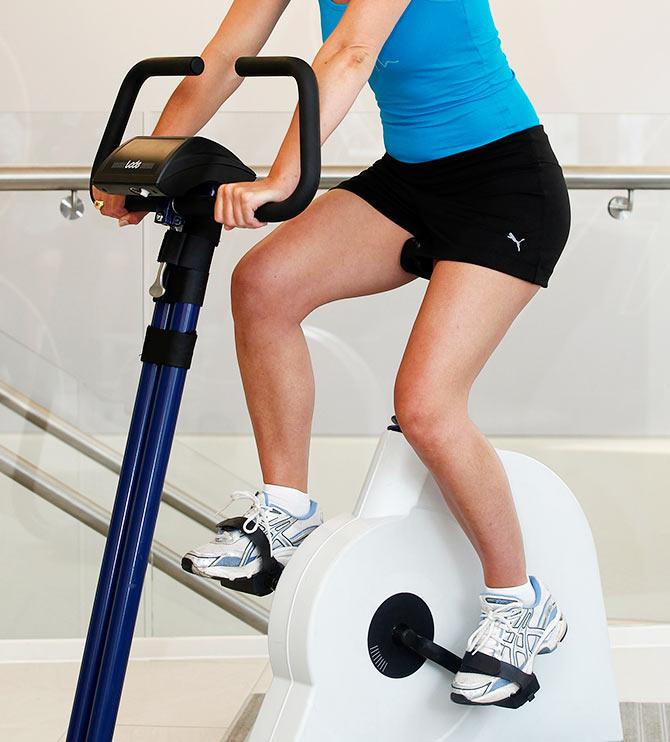 | « Back to article | Print this article |
Can exercising be a bad thing? Yes!
Okay so this may not be the couch potato's dream come true but exercising can sometimes be a bad thing says fitness trainer Brinda Sapat.

We've heard lots about the great benefits of exercise, but is there a flip side too?
Have you given up on it because it gave you a bad back, pain in the knees, stiffness or the like?
Here's when exercise seems to make trouble for you and what you can do about it.
Soreness
This isn’t much of a problem, but it can make you not want to move! It's a typical post exercise symptom.
Just shows that you have worked hard! Give your body enough rest. Use hot or cold packs and sip on some tea to relax the achy muscles. Gentle stretches will make you feel better.
Frequently catching colds, fever
1. Over exercising. Working out everyday with no "rest day" will fatigue the body, leaving it no room for rest and repair. It won’t show results and will lower your immunity levels making you susceptible to illness, aches and pains; and burn out.
2. Fluctuating temperatures. One should exercise in a comfortable temperature (not too hot/cold) and avoid a sudden contrast of hot or cold immediately after the workout.
Pain in the joints (of the backbone, knees, ankles, hips, shoulders, elbow etc)
Incorrect posture and technique of performing the exercise repeatedly over months results in joint damage. A trainer must guide you through every exercise focussing on correct posture and movement; for cardio, resistance training and stretching.
Joint pain in the lower body can also stem from improper footwear and walking/running/doing aerobics on concrete or uneven flooring.
Knee and elbow pain arises often from "locking" them. Always maintain soft knees and elbows through all exercises.
Stiffness and pain
Muscle and joint stiffness along with pain is a result of a workout plan that does not include enough stretching and flexibility improving exercises. This area is very commonly overlooked. A proper warm up, followed by a few flexibility exercises as part of your workout; and ending with a stretch session is extremely important to prevent post workout stiffness and improve joint flexibility.
Injuries
Ankle sprains, catches in the back, neck strain, hamstring pulls are few of the common injuries seen in exercise. Most often the reason is using momentum -- swinging actions instead of lifting and lowering with resisted muscle control. When the body swings using speed, the joints swing past their normal range; and the muscles’ protective response is to shorten suddenly to prevent the joint from going out of control. This shortening is the "catch", "pull" or "cramp".
Train your body to use calculated muscle control with every repetition of the exercise.
Fatigue and burn out
If your body is completely depleted of energy and you just can’t get around to moving, your body is burnt out. You may feel aches and pains, tired, sleepy and unwell. This comes with over exertion. You may be exercising too often, too long, too heavy or with too much intensity. It is very easy to get carried away especially if you are on some sort of a goal or merely an exercise fanatic.
Focus first on recovery. Rest for a few days. Hydrate well and eat energy boosting foods.
Get back to working out slowly. Make an exercise plan that allows your body enough rest and workout at appropriate intensity. This will ensure that you stay safe and reach your goals effectively and sooner.
Accidents
Faulty equipment can lead to falls, bruises or worse. Make sure the place you workout at does a routine equipment maintenance check. And just to be safe, check the piece before using it.
Lifting heavy loads
Avoid this at all costs. Showing off your strength to others or even yourself may have you pay dearly. Muscle strains and tears, bone fractures and can spike blood pressure to dangerous limits.
Photograph: Neil Mockford/Getty